Deus Ex's problem is that its predictions keep coming true
Hands on with Mankind Divided
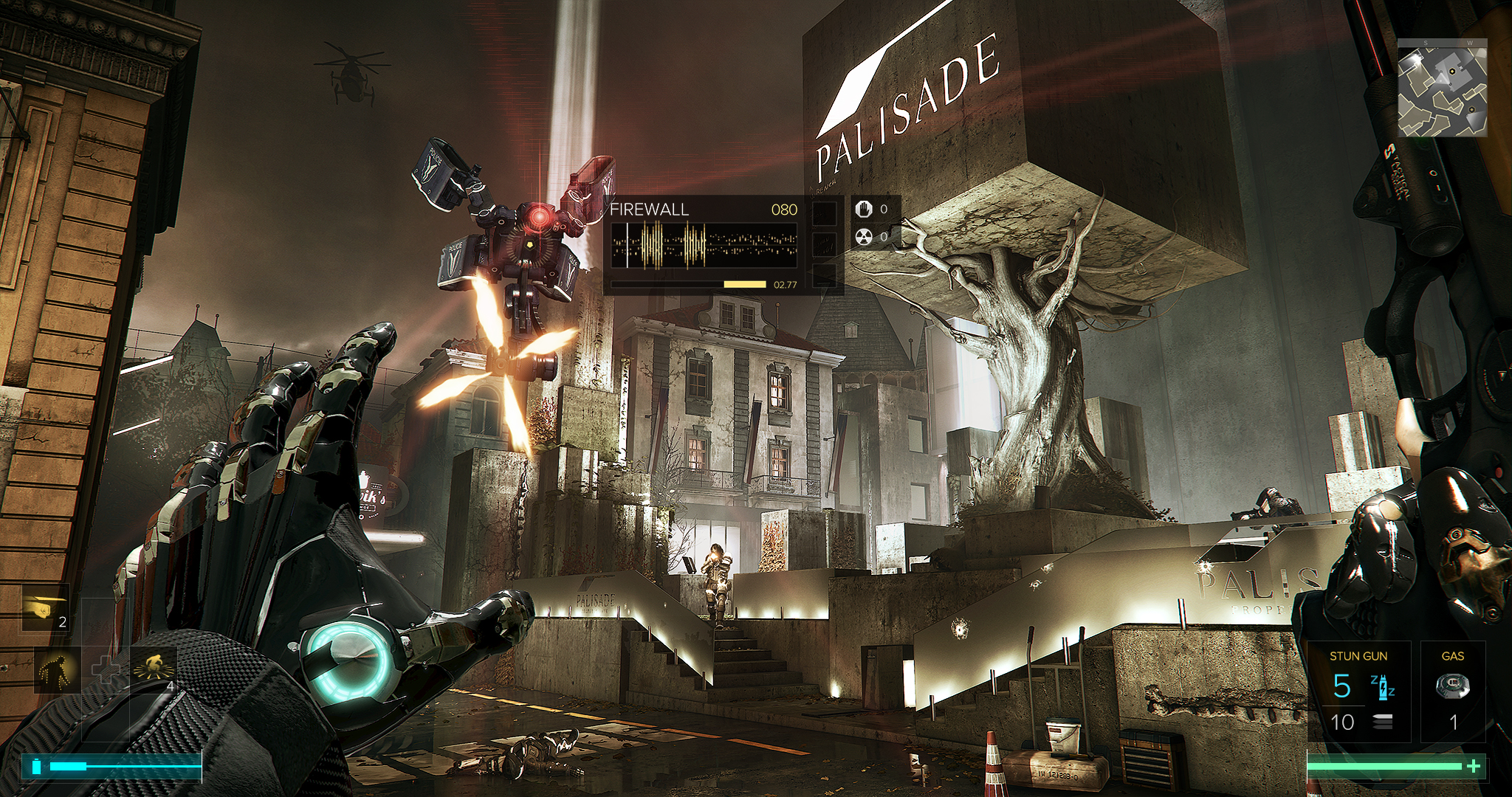
Deus Ex's developers don't like to describe the series as science fiction - they think the label makes it sound too farfetched. Instead, they use the term "futuristic anticipation", and when Deus Ex's biggest problem (or achievement, depending on how you look at it) is how its vision of the future has become eerily accurate, you can see why.
From the rising influence of giant mega corporations, to a growing wealth gap, to the way humans and technology are converging - sure, Deus Ex is a game about conspiracy theories, but you don't need a tin foil hat to see some of the parallels.
"A lot of what we invented in Human Revolution, the world has actually caught up to that in the last five years," Jonathan Jacques-Belletete, the game's executive art director, tells us. "That's a bit of a problem. But it's crazy, you just look at cybernetic prosthetics and stuff… it's caught up to certain things we invented in Human Revolution."
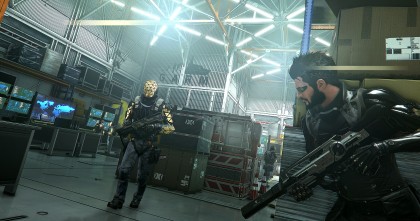
It actually left the team in an interesting dilemma back when they made Human Revolution, which was to be a prequel to Eidos Interactive's original Deus Ex by 25 years. Eidos Montreal made a conscious choice to modernise the technology despite it creating some inconsistencies with the timeline.
To help try to project a plausible future of augmented humanity in both Human Revolution and Mankind Divided, they also consulted Will Rosellini, a leading expert in transhumanism whose Twitter bio reads "Turning bodies into cars".
Only two fictional years separate Human Revolution's and Mankind Divided's stories, and you'll notice that some of tech has advanced further to account for real-world developments.
"All the touch technology - you're going to notice in Mankind Divided the information pads, the pocket secretaries and all these things," Jacques-Belletete tells us. "They've evolved from Human Revolution because obviously they've also evolved in the real world."
Sign up for breaking news, reviews, opinion, top tech deals, and more.
The team has also tried to ground the game's architecture in real-world examples. "I'll always tell my guys, even though we want to make futuristic looking buildings or skyscrapers or structures, never invent it from scratch, find something that already exists and get inspired from it," says Jacques-Belletete.
"Just look at the crazy architectural projects that are being done right now, or the ones that are projected for the next ten or fifteen years - it's crazier than what we're seeing in Hollywood sci-fi movies most of the time."
Tensions rising
"The good old days are gone," a police officer declares during our gameplay demo of Deus Ex: Mankind Divided. Indeed they have: it's been two years since the Aug Incident, where augmented humans were hijacked and controlled to kill millions of people.
The societal tension created from the fallout led to what the game refers to as the "Mechanical Apartheid", which has already caused some controversy. "Apartheid" is still a very loaded word, and some commentators felt the game's use of it was somewhat flippant.
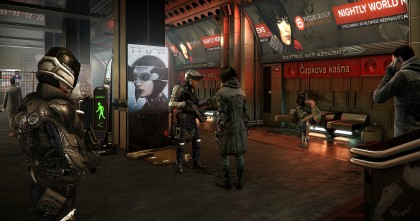
In Mankind Divided, society has segregated augmented and non-augmented humans, the latter now second-class citizens and many of them branded terrorists. This segregation is felt in the moments walking around the city: queues are separated by augs and non-augs, while non-augmented folks will act suspiciously around you.
Hacking has always been a big part of the Deus Ex franchise, and while the basic hacking gameplay is the same in Mankind Divided, it's now also more challenging thanks to booby traps and obstacles, which you'll need to find software to circumvent.
"It's the same recipe, I think we had something really good," says Jacques-Belletete. "We've just made it more fun. Something we wanted in Human Revolution but for all sorts of reasons didn't implement it is fog of war, so you don't always see the entire network."
"It has maybe a few more gamey elements but it still feels like this interestingly complex system without making it too much of a chore at the same time."
Accessing Jensen's augmentations is also easier. No longer do you have to go into a quick wheel to activate the ones you want; they can now be assigned to the D-pad or to the shoulder buttons.
And there are new augmentations to play with, including a smart vision augmentation that lets you see what weapons your enemies have, as well as illegal augmentations that can be purchased from the black market.
The team wanted to make more offensive augmentations this time around, so while the Titan Shield will let you take more damage, you'll also be able to launch Jensen's arm blade at your enemies, or fire out a Tesla EMP.
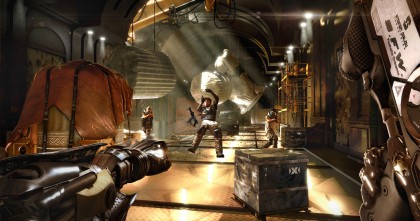
"Combat was good but it was not as good as it could be," Jacques-Bellette says on Human Revolution. "It lacked a bit of the viscerality. When you played stealth in Human Revolution you felt like you had something that was some of the best stealth you could have in gaming. And combat was decent but you felt it maybe wasn't as potent.
"And that's one of the things we spent more energy on in Mankind Divided, making sure we leveraged the combat pillar to be the best it could be and bring it to the same kind of level that stealth is, so the viscerality is there."
There's a central narrative that runs through Mankind Divided, but the developers also have expanded the optional side missions. We're told these stories can be wrapped up quickly, but you can dive deeper if you like. They're a good way to explore some of the more conspiratorial elements of the game.
Oh, and look out for the newspapers - the news will react to the actions you take in the game.
Breach it!
And then there's Breach, another new element set in an in-game virtual reality. To call Breach a mini game feels reductive, so think of it as more of a companion game in which you hack mega corporations to extract their data.
However, rather than fiddling with nodes and terminals, the game actually plonks you and your gun into a level that you must navigate to find the data, using stealth and combat to outwit turrets and security cameras as you go.
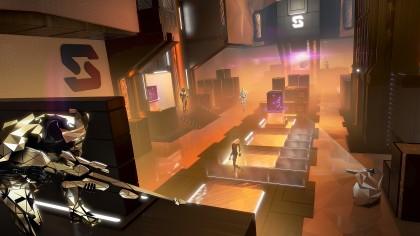
But hey, why does Breach look the way it does? To explain, here are a couple of fun facts. First: you might not have noticed this, but there is almost no trace of pink and purple colors in Human Revolution and Mankind Divided.
In fact, the only time you see pink is on the robot newsreader Eliza Cassan. "So what we're saying in the world is that the color pink is not real, and the only character who's not real, she has the color pink," explains Jacques-Belletete.
"Whenever the guys want to put pink or purple it's almost become a joke. I'm like 'No, you've put purple, you can't put it in the game'."
But when it came to creating the game mode Breach, which is set in a completely virtual world, the palette was inverted, and the mode is filled with more magentas, whites and fuschias than you can shake a wedding bouquet at.
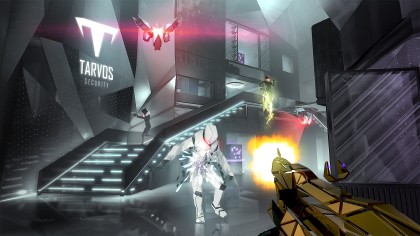
Which brings us to our second fun fact: you've already seen Breach. Well, you caught a glimpse if you happened to see the Deus Ex April Fool's video, which riffed on the aforementioned color scheme and showed a screen at the end that teased the new mode.
We really like what we've played of Breach so far: its more arcade-style gameplay offers something that feels quite different from the campaign. It also lets you share your times with others and set challenges for friends to complete.
Real augmentation
Deus Ex: Mankind Divided is intertwining itself with real-world technology in other interesting ways, most notably through a partnership with robotics startup Open Bionics, which is creating a special Adam Jensen bionic hand. You can read more on that here.
The game is also getting on the virtual reality bandwagon - but not as you might hope. Eidos Montreal is launching a VR benchmarking tool to coincide with the game: you'll be able to strap on an Oculus Rift and explore a number of rooms set in the Deus Ex universe.
Unfortunately you won't be able to interact with the environment, let alone deploy any of Jensen's brutal takedowns in glorious VR, but it's a nice added component.
Jacques-Belletete refuses to comment either way on whether this could be a hint towards bigger VR plans, but we could see it working with Breach mode.
All these things considered, you might joke that Deus Ex is becoming a self-fulfilling prophecy.
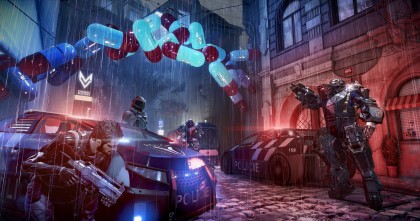
Mankind Divided is set to arrive August 23, after a delay set the game back by six months, and from what we've seen and played so far, Human Revolution fans have a lot to look forward to.
Many of the flaws of the original have been addressed, the environments feel richer, and Jensen's augmented abilities feel, appropriately, more integrated into the experience. So far it's Deus Ex through and through, but with even more to love.
The future is almost upon us.

Hugh Langley is the ex-News Editor of TechRadar. He had written for many magazines and websites including Business Insider, The Telegraph, IGN, Gizmodo, Entrepreneur Magazine, WIRED (UK), TrustedReviews, Business Insider Australia, Business Insider India, Business Insider Singapore, Wareable, The Ambient and more.
Hugh is now a correspondent at Business Insider covering Google and Alphabet, and has the unfortunate distinction of accidentally linking the TechRadar homepage to a rival publication.